What causes cerebral hypoxia?
Under normal circumstances, cerebral hypoxia may be caused by environmental factors, strenuous exercise, anemia, chronic obstructive pulmonary disease, cerebral infarction, and other reasons. Symptomatic management usually involves general treatment, medication, and other methods. If discomfort occurs, it is recommended to seek timely medical treatment. The specific analysis is as follows:

1. Environmental factors
Remaining in an environment with poor air circulation or in enclosed spaces, such as sealed offices, basements, or high-altitude areas, may lead to a decrease in oxygen levels in the air, causing insufficient oxygen supply to the brain. Symptoms may include dizziness, headache, and difficulty concentrating. It is recommended to ventilate by opening windows promptly, relocate to a lower-altitude area, or undergo oxygen therapy to supplement oxygen levels.
2. Strenuous exercise
During strenuous exercise, the oxygen demand of muscles increases rapidly, and the heart and lungs require time to adjust to meet this demand. During this process, if the heart's pumping capacity or the lungs' ventilation capacity cannot keep up with the muscles' oxygen demand, it may cause temporary cerebral hypoxia. It is recommended to gradually increase exercise intensity and avoid sudden high-intensity exercise, which helps the body adapt gradually and improve cardiopulmonary function.
3. Anemia
Malnutrition, excessive blood loss, or impaired hematopoietic function can lead to anemia. A reduced number of red blood cells or low hemoglobin levels caused by anemia decrease the blood's oxygen-carrying capacity, resulting in insufficient oxygen supply to the brain and causing cerebral hypoxia. It is recommended to follow medical advice and use medications such as compound ferrous sulfate granules, ferrous gluconate tablets, and iron sucrose injection for treatment.
4. Chronic obstructive pulmonary disease (COPD)
Chronic obstructive pulmonary disease may be caused by long-term smoking, air pollution, and other factors. Impaired gas exchange in the lungs due to COPD reduces blood oxygen levels, and when blood flows through the brain, it cannot supply sufficient oxygen, leading to cerebral hypoxia. It is recommended to follow medical advice and use medications such as theophylline sustained-release tablets, salbutamol inhalation aerosol, and salbutamol sulfate sustained-release capsules for treatment.
5. Cerebral infarction
Cerebral infarction caused by cerebrovascular accidents directly interrupts blood supply to localized areas of the brain, depriving the brain tissue in that area of sufficient oxygen and nutrients, thereby causing localized cerebral hypoxia. It may also be accompanied by symptoms such as hemiplegia, slurred speech, and impaired consciousness. It is recommended to follow medical instructions and use medications such as edaravone injection, sodium citicoline capsules, and piracetam capsules to alleviate symptoms.
It is recommended to engage in appropriate aerobic exercises, such as jogging, swimming, and yoga, which can enhance cardiopulmonary function and improve oxygen delivery capacity.








